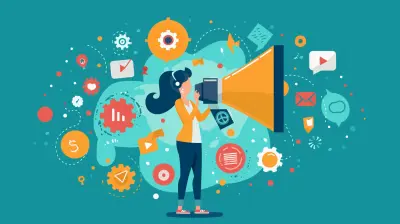The Best Ways to Use Online Resources for Studying
10 September 2025
Let's be honest—studying can be tough. Not because we’re lazy, but because there's just so much information and not enough time. Luckily, thanks to the internet (our modern-day genie in a bottle), studying has transformed into something smarter, quicker, and—dare I say it?—even fun.
Whether you’re prepping for finals, staying ahead in class, or brushing up on a subject you once slept through (hey, no judgment), online resources can be your secret weapon. But here’s the catch—not all online study tools are built equal. Some can boost your brainpower while others just leave you more confused.
So, how do you make the best use of all that digital goodness?
Let’s dive into the best ways to use online resources for studying and actually make them work for you.
1. Start With a Plan—Don't Just Click Around
First things first, let’s address the elephant in the room: internet distractions.We’ve all been there—one minute you’re watching a math tutorial, the next you’ve fallen into a rabbit hole about the history of pizza. It happens. So before you open your laptop, have a clear goal in mind. What exactly do you need to learn today?
Set small, specific goals like:
- Finish one chapter of biology notes
- Watch two video lessons on calculus
- Take a 10-question quiz on world history
Tip: Use a simple to-do list or a study planner app (like Notion or Todoist) to stay on track.
2. Use YouTube the Smart Way
Sure, YouTube is home to cat videos and baby shark songs, but it’s also one of the most powerful learning platforms out there. The key is targeting the right content.Look for channels that offer clear, concise, and engaging tutorials. Some top-notch academic YouTube channels include:
- CrashCourse (for a fast-paced overview of almost anything)
- Khan Academy (legendary for math and sciences)
- The Organic Chemistry Tutor (for deep-dives with examples)
- Physics Girl (makes science super fun)
Use the pause, rewind, and playback speed features. If a concept is tricky, replay it. If it’s too slow, speed it up. It’s like having your own personal tutor—minus the awkward silences.
3. Take Advantage of Free Online Courses
Now, I know what you’re thinking: “I’m already in school, why would I take more courses?” But hear me out.Sometimes, the way something is explained in class just doesn’t click, right? That’s where free online courses can work their magic. They offer different teaching styles, interactive quizzes, and real-world examples that help drive the point home.
Try these platforms:
- Coursera – Created in partnership with top universities
- edX – Offers free versions of courses from Harvard, MIT, and more
- Udemy – Affordable courses with reviews to guide your pick
Pro tip: Focus on free courses with video lectures, quizzes, and certificates. Bonus motivation? Add certificates to your resume or LinkedIn.
4. Use Flashcards—Digitally
Online flashcards are the bread and butter of smart studying. Why? Because they use active recall and spaced repetition—fancy terms for the best way to stick stuff in your brain for good.Try these tools:
- Anki – Best for long-term memorization
- Quizlet – Easy to use and great for visual learners
- Brainscape – Good for tracking your mastery levels
You can search for pre-made flashcard decks or create your own. Either way, it beats flipping through index cards that somehow always get lost under your bed.
5. Join Online Study Groups and Forums
Remember how group study sometimes turns into a snack party? Online study groups are less about snacks and more about focus.Platforms like:
- Reddit (e.g., r/StudyTips, r/AskAcademia)
- Discord student servers
- Facebook study groups
- Study Together (a virtual co-study room)
These communities let you ask questions, share resources, and work alongside others with the same goals. You’re not alone in this academic jungle—lean on your digital tribe.
6. Practice with Online Quizzes and Past Papers
Enough theory. Let’s talk practice. You wouldn't learn to swim by reading a book, right? Same goes for subjects like math, science, and even literature. You need to test yourself.Here's where to go:
- Khan Academy Practice Sections
- BBC Bitesize for UK Curriculum
- SAT/ACT Practice on College Board
- Past Papers on school/university websites
By doing practice questions, you do two things:
1. Identify your weak spots
2. Train your brain to tackle similar problems in exams
It’s like dress rehearsal for the big day.
7. Get Organized with Digital Tools
Let’s face it, keeping track of online notes, assignments, and videos scattered across tabs is a recipe for chaos. Time to bring in some digital muscle.Use apps like:
- Evernote or OneNote – For organizing lecture notes
- Google Keep – For quick thoughts and reminders
- Notion – An all-in-one dashboard for notes, tracklists, and goals
- Trello – Great for organizing a study schedule with deadlines
The more organized you are, the less you’ll waste time figuring out where your notes disappeared to. Trust me, your future self will thank you.
8. Use Educational Podcasts During Downtime
Can studying be… passive? Sort of.When your hands are busy but your brain is free—like when you’re walking, cooking, or trying to fall asleep—listen to educational podcasts.
Try:
- Stuff You Should Know
- Science Vs
- The History Extra Podcast
- Grammar Girl
You’ll absorb knowledge without even trying too hard. It’s like subliminal learning, only more effective.
9. Integrate Learning Apps into Your Routine
We’ve all got a phone addiction. Why not use it for good?Here are a few apps that make studying feel less like a chore:
- Duolingo – For fun, gamified language learning
- Brilliant – For logic, math, and science-based thinking
- Photomath – Snap a pic of a math problem and get step-by-step solutions
- Forest – Helps you stay focused by growing virtual trees when you don’t touch your phone
Turn those “just five minutes” into meaningful learning moments.
10. Watch Documentaries and Educational Series
Sometimes textbooks just… don’t cut it. They’re dry. Lifeless. Enter documentaries—the Netflix of learning.Try:
- YouTube Documentaries (like DW, BBC, or National Geographic)
- Netflix: Explained, Our Planet, or History 101
- CuriosityStream: The Netflix for nerds
By watching real-world examples and storytelling, you’re not just memorizing—you’re connecting the dots.
11. Beware of Misinformation
Here’s the downside of the internet: not everything is true. Shocking, I know.Always double-check:
- Who created the content? Is it credible?
- Are the facts backed by research?
- Is it up-to-date?
Stick to trusted sources (university-backed websites, verified educators, and known platforms). And if Reddit user “CoolDude69” says the answer is C on your math quiz, maybe don’t bet your grade on it.
12. Take Breaks and Avoid Burnout
We can’t talk about studying without mentioning burnout. The internet gives us unlimited access to information but your brain needs limits.Practice:
- The Pomodoro Technique (25 mins study, 5 mins break)
- Breaks with physical movement (at least stretch!)
- Logging off all screens for 10 minutes after heavy sessions
You’re not a robot. Treat your brain like a battery; charge it wisely.
13. Personalize Your Study Routine
Don’t get caught in the trap of mimicking someone else’s perfect-looking study setup. Use online resources that fit your style.Visual learner? Go for diagrams and videos.
Auditory learner? Podcasts and audio lessons.
Kinesthetic? Interactive platforms and quizzes.
Tweak, test, and tailor your tools until studying feels right—for YOU.
14. Keep Track of Your Progress
One of the keys to sticking with studying is seeing how far you’ve come.Use tools like:
- Google Sheets for tracking grades or progress
- Habit tracking apps like Habitica or Streaks
- Journaling apps to reflect on your learning journey
Celebrate little wins. Finished a tough chapter? That’s a victory. Aced a quiz? Reward yourself. Learning takes time—acknowledge every step.
Final Thoughts
Online resources are powerful—like supercharged study-sidekicks. But just like any tool, it’s how you use them that makes the difference. Build a study routine that’s efficient, organized, and—dare I say—fun. Mix things up, stay curious, and take advantage of the bottomless pit of knowledge just a click away.And hey, next time you fall down a YouTube hole, maybe make sure it starts with a CrashCourse video and only ends with pizza history.
all images in this post were generated using AI tools
Category:
Study HabitsAuthor:

Madeleine Newton
Discussion
rate this article
1 comments
Eleanor Newman
Embracing online resources can unlock a world of knowledge and enhance your learning experience! From interactive tools to diverse study materials, these platforms empower you to study smarter and more efficiently. Dive in, explore, and let your curiosity lead the way to success!
September 13, 2025 at 11:22 AM

Madeleine Newton
Absolutely! Leveraging online resources can significantly enhance your study experience and lead to greater success. Dive in and explore the vast tools available!


